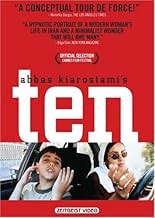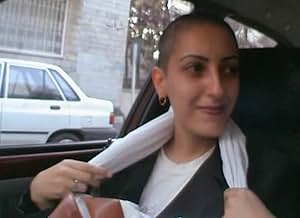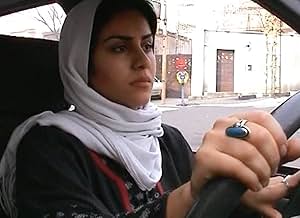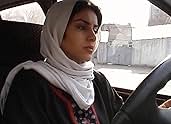VALUTAZIONE IMDb
7,4/10
8901
LA TUA VALUTAZIONE
Un'indagine sociale nella forma di dieci conversazioni tra una donna che guida e i vari ospiti e passeggeri di lei.Un'indagine sociale nella forma di dieci conversazioni tra una donna che guida e i vari ospiti e passeggeri di lei.Un'indagine sociale nella forma di dieci conversazioni tra una donna che guida e i vari ospiti e passeggeri di lei.
- Regia
- Sceneggiatura
- Star
- Premi
- 1 vittoria e 4 candidature totali
Amina Maher
- Amin
- (as Amin Maher)
Roya Akbari
- Prostitute + Lover
- (as Roya Arabshahi)
Recensioni in evidenza
"Ten" really impressed me for many reasons. The first one is the interpretation of the non-professional actresses and the boy Amin Maher. It is simply amazing the first sequence (number 10) with fifteen minutes of dialogs between the lead character and her son without any cut. The second reason is the intense and impressive insight in the repressed women's world in Iran. I believe that most of the Westerns have no idea about the feelings and the culture of Iranian women, and Abbas Kiarostami shows very real dialogs picturing the lifestyle of a middle class woman and some samples in other women of different classes (the prostitute, the religious woman etc.). The third reason was the simplicity and the originality of the location: inside a car, with a divorced woman transporting her resented son; her sister; a prostitute; an old lady; and a romantic young woman, along different days. I would never imagine such a splendid scenario for a movie with such a theme. Last but not the least, the remarkable beauty of the face of the driver (Mania Akbari) is awesome: she is exotic for Brazilian standards, but really a very beautiful woman. My vote is eight.
Title (Brazil): "10 Dez" ("10 Ten")
Title (Brazil): "10 Dez" ("10 Ten")
Yes, it's a gimmick: the entire film is shot from the dashboard of a car, and only the driver and the passenger are heard and (sometimes) seen. This gimmick will not please everyone, and hardly qualifies the film as a masterpiece. But Hitchcock's brilliant "Rear Window" was a gimmick too, and Kiarostami's "10" is no less worthy of attention. A movie has to be done well, regardless of its tricks, and "10" fits the bill. The driver of the car also drives the conflict; she is a recently divorced Iranian woman in a country in which women barely have the right to divorce at all. As the city rushes past--it's great fun to watch the people and places outside--she curses the drivers and pedestrians along the way but holds her own against the crises in the passenger's seat. Funny thing about a car: it gives one the sense of control (here, that's clearly an illusion) and the oxymoronic ability to remain private even while out in public. She and her women passengers air their grievances within this zone of safety; a scene in which a passenger slowly removes her head covering, a symbol of repression, is moving and unsettling. The greatest conflict, however, is between the driver and her young son, who's bitter about the divorce and lets his mother unravel until he, not she, controls where the car is heading. The boy's performance is astonishingly real, as much for the way he fills the silences as for his sharp and sometimes humorous counterpoints. The film could have done without the "countdown" of the 10 conversations--the source of the title--but no matter: everything in between is a delight.
8 out of 10
8 out of 10
Ten is an intriguing movie. Kiarostami explores the abilities of digital camera by mounting it at just two fixed angles on the dashboard of a car, showing us almost only the driver's and the passenger's faces. Such a stationary structure surprises by its moving content, which takes shape as the movie unfolds.
The driver is a young Iranian divorcée, recently remarried, whose conversations with a son, sisters, a young and an old woman makes up the ten episodes of the movie.
The performance taken from the kid is astonishingly natural, and other characters also appear to be just playing their everyday lives. Kiarostami opens an eye through the little gap of its two fixed digital cameras on the mundane facts of the Iran's capital life as experienced by a typical middle-class woman. The plots are so natural no one can find a better way of experiencing the knotted, contradictory complexity of such a woman's life in Iran from outside. The flow is of the scenes is smooth and the dialogues are, at least to the Iranian audience, courageous and funny, though familiar at the same time. It's a movie worth watching more than once.
The driver is a young Iranian divorcée, recently remarried, whose conversations with a son, sisters, a young and an old woman makes up the ten episodes of the movie.
The performance taken from the kid is astonishingly natural, and other characters also appear to be just playing their everyday lives. Kiarostami opens an eye through the little gap of its two fixed digital cameras on the mundane facts of the Iran's capital life as experienced by a typical middle-class woman. The plots are so natural no one can find a better way of experiencing the knotted, contradictory complexity of such a woman's life in Iran from outside. The flow is of the scenes is smooth and the dialogues are, at least to the Iranian audience, courageous and funny, though familiar at the same time. It's a movie worth watching more than once.
The front-page review of this film simply doesn't do this marvelous film justice. Renowned Iranian film-maker Abbas Kiarostami takes an innovative approach at giving us a very deep glimpse not only into the life of mother and child, but also into Iran, its society and the situation of women transitioning to a more assertive role in society (however, I don't think one should be confused that the issues women face in Iran are not relevant to women elsewhere in the world, including the West).
The film has two fixed camera angles, one giving us a view of the driver-side and the other a view of the passenger side of an automobile. The driver is a mother who has left her husband and now resides with her new lover (she is the common thread in all ten "episodes"). Each sequence places a different person in the passenger seat, with particular emphasis on her son (who rides in four of the 10 scenes, if I'm not mistaken).
It is this mother-son relationship that is at the crux of the film, and for good reason. The performances of these two characters was nothing short of amazing. The boy in particular, with every eye-twitch, frown, smile, and outburst was able to convey a frighteningly realistic portrayal of a boy who is all at once obstinate, angry, disrespectful, and immature, yet still sweet and somewhat an innocent victim of the situation. He is unforgiving to his mother for walking out on him and "breaking up the family" and is reluctant to accept any explanation his mother offers. They trade barbs and though the love is there, you can see the seeds already planted in the young adolescent of a society that subordinates women to their male partners. Here, it is so profound that even a pre-teen lectures his mother on right and wrong.
The mother bounces back and forth between defending herself to accepting blame, showing the cracks of guilt that clearly lie beneath her composed and beautiful surface. And it's a beauty that her son can't recognize: she's a sexy passionate woman with needs of not just a mother but also as a lover and a liver; but like all children he can only see her as an adult and a mother.
The other key character involves a friend who desperately seeks a life partner, but finds herself unsuccessful at every turn. Most recently, a man she has been seeing tells her that he cannot marry her because he does not love her. She coyly reveals from under her veil that in her grief she has shaved her head completely. This act is astonishing not because it is defiant but because it is terribly charming. She can't offer an explanation as to why she has done it, but no explanation is necessary. Who hasn't at some time when an ego has been made fragile by rejection, sought to change hair, clothing, face, self? And it is with this scene, with veil pulled back, that the woman's beauty is uncovered, not because we see her hair or her bald head, but because of the insight the shaving act gives to her character, and her innocent embarrassment brings a smile to her tear-stained face that lights up the screen.
I give the film a 9 and not a 10 because of one sequence involving a conversation with a prostitute in the passenger seat. Presumably the driver has given a ride to hitch-hiker, leading to an intelligent conversation/debate about the world's oldest profession. But this scene seemed a little out-of-place, contrived, and added little to the more general theme of the rest of the film. This one slip-up notwithstanding, "Ten" is a creative and wonderful experience for film lovers who seek something out of the ordinary. And it has a final scene which punctuates the film perfectly.
The film has two fixed camera angles, one giving us a view of the driver-side and the other a view of the passenger side of an automobile. The driver is a mother who has left her husband and now resides with her new lover (she is the common thread in all ten "episodes"). Each sequence places a different person in the passenger seat, with particular emphasis on her son (who rides in four of the 10 scenes, if I'm not mistaken).
It is this mother-son relationship that is at the crux of the film, and for good reason. The performances of these two characters was nothing short of amazing. The boy in particular, with every eye-twitch, frown, smile, and outburst was able to convey a frighteningly realistic portrayal of a boy who is all at once obstinate, angry, disrespectful, and immature, yet still sweet and somewhat an innocent victim of the situation. He is unforgiving to his mother for walking out on him and "breaking up the family" and is reluctant to accept any explanation his mother offers. They trade barbs and though the love is there, you can see the seeds already planted in the young adolescent of a society that subordinates women to their male partners. Here, it is so profound that even a pre-teen lectures his mother on right and wrong.
The mother bounces back and forth between defending herself to accepting blame, showing the cracks of guilt that clearly lie beneath her composed and beautiful surface. And it's a beauty that her son can't recognize: she's a sexy passionate woman with needs of not just a mother but also as a lover and a liver; but like all children he can only see her as an adult and a mother.
The other key character involves a friend who desperately seeks a life partner, but finds herself unsuccessful at every turn. Most recently, a man she has been seeing tells her that he cannot marry her because he does not love her. She coyly reveals from under her veil that in her grief she has shaved her head completely. This act is astonishing not because it is defiant but because it is terribly charming. She can't offer an explanation as to why she has done it, but no explanation is necessary. Who hasn't at some time when an ego has been made fragile by rejection, sought to change hair, clothing, face, self? And it is with this scene, with veil pulled back, that the woman's beauty is uncovered, not because we see her hair or her bald head, but because of the insight the shaving act gives to her character, and her innocent embarrassment brings a smile to her tear-stained face that lights up the screen.
I give the film a 9 and not a 10 because of one sequence involving a conversation with a prostitute in the passenger seat. Presumably the driver has given a ride to hitch-hiker, leading to an intelligent conversation/debate about the world's oldest profession. But this scene seemed a little out-of-place, contrived, and added little to the more general theme of the rest of the film. This one slip-up notwithstanding, "Ten" is a creative and wonderful experience for film lovers who seek something out of the ordinary. And it has a final scene which punctuates the film perfectly.
10nycterr
The film shows ten rides of a female cab-driver in modern Teheran. The protagonist (a sunglasses-wearing beautiful woman) share a ride with her son, her sister, an old faithful lady, a prostitute and a female stranger. She discuss life and social issues, and repeatedly argue with her son about her recent divorce with the boy's dad.
The movie is technically interesting and well shaped.
---- Structure The film rolls the 10 sequences introduced by a a classic old school countdown which creates a sense of formal structure, giving the film an apparent "rigid" putting the audience as "analyst".
---- Camera and Sound Only two camera angles are used in the film (beside an odd little part where we see the prostitute outside of the car ...). And the sound is very basically real and full (city's life and traffic).
---- Content But above all, despise what some will say about the apparent boringness of the film, the content is amazingly absorbing. The issues raised are universal (divorce, women's position in society, love, despair, faith ...) and perfectly rendered by these non-actors.
One last point, the female protagonist is BEAUTIFUL !
The movie is technically interesting and well shaped.
---- Structure The film rolls the 10 sequences introduced by a a classic old school countdown which creates a sense of formal structure, giving the film an apparent "rigid" putting the audience as "analyst".
---- Camera and Sound Only two camera angles are used in the film (beside an odd little part where we see the prostitute outside of the car ...). And the sound is very basically real and full (city's life and traffic).
---- Content But above all, despise what some will say about the apparent boringness of the film, the content is amazingly absorbing. The issues raised are universal (divorce, women's position in society, love, despair, faith ...) and perfectly rendered by these non-actors.
One last point, the female protagonist is BEAUTIFUL !
Lo sapevi?
- QuizApart from Mania Akbari, actors are non-professional. The young boy is played by her own son and their relationship is partly based on real-life elements.
- BlooperCar windows, both driver's and passenger's, vary between being closed, part-open or open between shots.
- Citazioni
Prostitute: [to a Married woman] You are wholesailers. We are retailers.
- ConnessioniFeatured in 10 on Ten (2004)
- Colonne sonoreWalking In The Air
Written and Performed by Howard Blake
© Chester Music Limited represented by Première Music Group
I più visti
Accedi per valutare e creare un elenco di titoli salvati per ottenere consigli personalizzati
- How long is Ten?Powered by Alexa
Dettagli
- Data di uscita
- Paesi di origine
- Sito ufficiale
- Lingua
- Celebre anche come
- Ten
- Luoghi delle riprese
- Aziende produttrici
- Vedi altri crediti dell’azienda su IMDbPro
Botteghino
- Lordo Stati Uniti e Canada
- 105.990 USD
- Fine settimana di apertura Stati Uniti e Canada
- 10.559 USD
- 9 mar 2003
- Lordo in tutto il mondo
- 452.895 USD
Contribuisci a questa pagina
Suggerisci una modifica o aggiungi i contenuti mancanti






















